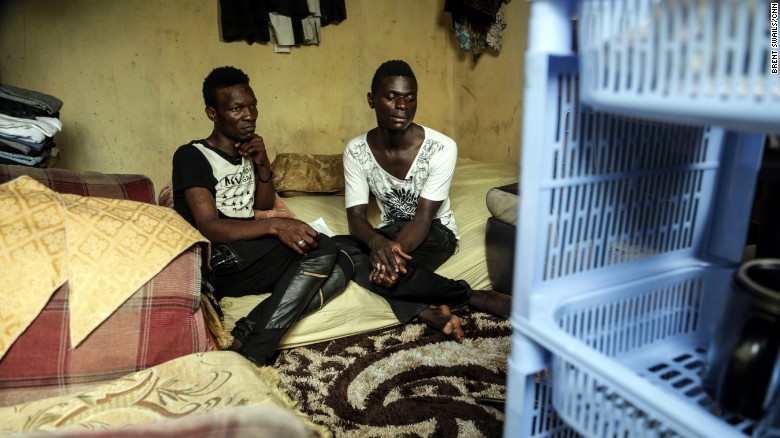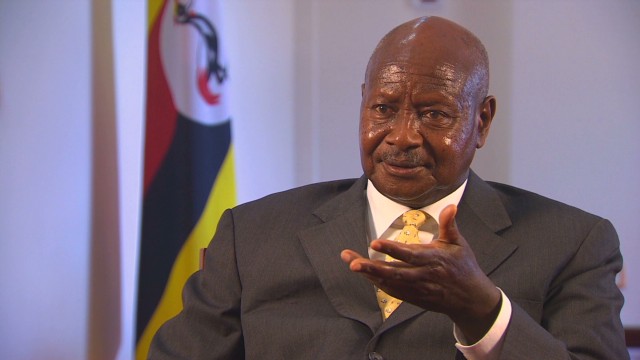Story highlights
- Pope Francis visits Uganda on his three-leg trip through Africa
- He appeared to soften the Church's stance on homosexuality in 2013 comments
- The sentiment won't be popular in Uganda, where gays have come under attack
Kampala, Uganda (CNN)God isn't hard to find in Kampala.
The Lord's name is invoked at the Grace is God Milk Center on one street in the Ugandan capital, and the My God is Good Oooh Boutique on another. And if it's wine you seek, there's the Pool of God's Grace liquor store around the corner.
On a Sunday at Rubaga Cathedral, perched on one of Kampala's famous hills, the faithful pack the pews for the afternoon Buganda service.
In simple green robes, the priest gives communion as the strains of the choir ring out through the hall.
At a Tuesday service for a Pentecostal congregation in the capital, there is no singing. Instead, hundreds gather here in a rented theater, raising their handbags and smartphones in the air as they pray for prosperity.
Hundreds more fill the marquees outside, watching on flat-screen TVs as pastor David Ssebuguzi promises direct communication with the Holy Spirit.
"We are not just the pearl of Africa," says Pastor Ssebuguzi, "we are God's choice."
So Uganda is, perhaps, an obvious choice for Pope Francis' three-day visit here on his Africa tour. And although there hasn't been a papal visit to the country for more than twenty years, some priests and pastors here are planning to put the pontiff on the spot.
In 2013, Pope Francis surprised many when he seemed to take a softer tone on conservative Catholic views on homosexuality. "If a person is gay and seeks God and has good will, who am I to judge?" he told reporters on a flight out of Brazil.
In Uganda, those sentiments won't be popular.
"His stand is simply hypocritical. He must take a stand as a leader. I don't believe in being lukewarm," says Pastor Solomon Male. "You tell the people that this is the truth, this is the way. Homosexuality is dangerous."
Global outrage over Uganda's "anti-gay" bill
Uganda first drew global outrage for its treatment of the LGBT community when the so called "anti-gay bill" was drafted by Ugandan politicians with significant input from local pastors and American evangelists.
Supporters said that the bill was necessary to close loopholes in colonial-era anti-sodomy laws by targeting so-called recruitment of gays.
But human rights groups and gay activists in Uganda say the bill helped to fan hatred against LGBT Ugandans, and scores went into hiding or fled the country for their safety.
For those who stayed, the situation only grew worse.
For Jackson Mukasa and Kim Mukisa, the trouble started with a knock on the door. The knocks turned to banging and then shouting.
Mukasa knew then that a mob was outside.
"We heard people screaming 'the gays are here! The gays are here!' We expected to be killed," recalls Mukasa.
As the mob grew and was joined by local media, Mukisa pleaded with Mukasa to save some of their belongings.
But in the chaos they were separated. Mukisa got away for a time, but the crowd severely beat Mukasa and then marched them to the local police station. Their alleged crime: engaging in sex acts "against the order of nature."
"We never knew we were suspected," Mukasa said. "We couldn't stop expressing what we are. We are proud of what we are."
After a series of text messages and careful instructions, we meet the pair at a friend's place in Kampala. They recount their story sitting side by side on the bed in a cramped rented room in a slum.
After the mob attack, they were put on trial at a magistrate's court. They spent months in prison before their case was eventually thrown out for lack of evidence.
But the damage was already done. Now Mukasa and Mukisa are too afraid to travel together on public transport, their families have abandoned them, and they can't go back home.
"It's so hurtful that people hate us so much when they realize that we are gays. You know how you feel when you are not loved by people? You feel so bad," says Mukasa.
Uganda's president on gays: "They're disgusting"
Ugandan rights groups watched in horror as a version of the anti-gay bill was passed in parliament in late 2013. And despite intense pressure from the international community, President Yoweri Museveni signed the bill into law in February of the following year.
Shortly afterward, Museveni told CNN that homosexuality is "unnatural" and not a human right.
"They're disgusting. What sort of people are they?" he said. "I never knew what they were doing. I've been told recently that what they do is terrible. Disgusting. But I was ready to ignore that if there was proof that that's how [a man] is born, abnormal. But now the proof is not there."
In the end the law was thrown out on a technicality by the constitutional court -- a move many see as an effort by the President to avoid donor withdrawals while saving face domestically.
But the main sponsor of the bill, MP David Bahati, said lawmakers are planning to bring it back to parliament in a new form.
"We hope that the Pope will be able to stand and say something about this and confirm what is written in the Bible to Uganda and to the world -- and encourage many of who have been working to make sure that the word that is written in the Bible is never destroyed," Bahati told CNN.
For Jackson Mukasa and Kim Mukisa, one of their few options is to try to seek asylum in the West. Now that their story has been widely reported in local media during their trial, they live in constant fear of reprisals.
"I have a question for God -- that is why I would like to meet God. I know God knows everything," says Mukasa. "He knew that I would be gay. He knew you would be what you are."
"So I have a question: Is it that being gay is a crime to God? That's why all these things are happening?"








